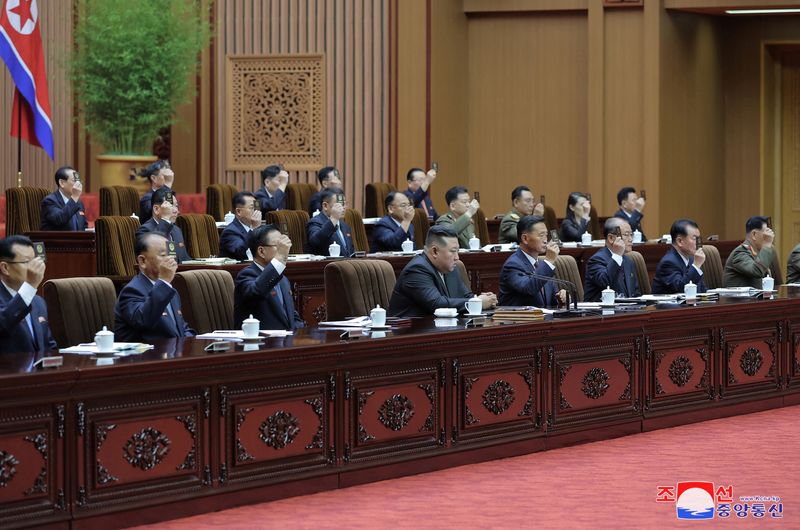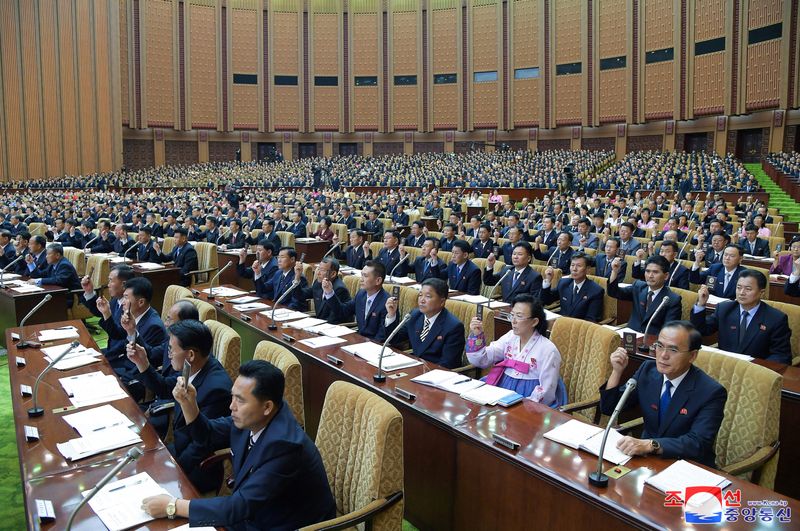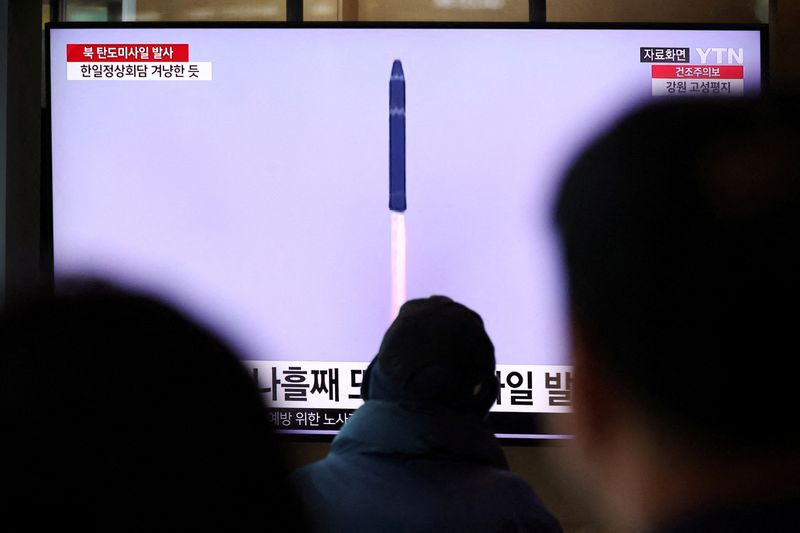By Soo-hyang Choi and Hyonhee Shin
SEOUL (Reuters) -North Korea has adopted a constitutional amendment to enshrine its policy on nuclear force, state media reported on Thursday, as the country’s leader pledged to accelerate production of nuclear weapons to deter what he called U.S. provocations.
The Supreme People’s Assembly unanimously adopted the revision that states North Korea “develops highly nuclear weapons to ensure” its “rights to existence” and to “deter war”, news agency KCNA reported, after the conclusion on Wednesday of a two day-meeting of the North’s rubber-stamp parliament.
“The DPRK’s nuclear force-building policy has been made permanent as the basic law of the state, which no one is allowed to flout with anything,” North Korean leader Kim Jong Un said, addressing the parliament. DPRK are the initials of the North’s official name, the Democratic People’s Republic of Korea.
Kim went on to stress “the need to push ahead with the work for exponentially boosting the production of nuclear weapons and diversifying the nuclear strike means and deploying them in different services.”
And he said U.S. military drills and deployment of strategic assets in the region were extreme provocations.
South Korea’s unification ministry said the revised constitution showed Pyongyang’s “strong will” not to abandon its nuclear programme.
“We once again stress that North Korea will face an end of its regime if it uses nuclear weapons,” it warned in a statement.
Japanese Chief Cabinet Secretary Hirokazu Matsuno said: “North Korea’s nuclear and missile development poses threats to peace and safety of our country and the international community, and can never be tolerated.”
The amendment comes a year after North Korea officially enshrined in law the right to use preemptive nuclear strikes to protect itself, a move Kim had said would make its nuclear status “irreversible”.
Kim urged officials to further promote solidarity with the nations standing against the United States, denouncing trilateral cooperation between the U.S., South Korea and Japan as the “Asian-version NATO.”
“This is just the worst actual threat, not threatening rhetoric or an imaginary entity,” he said.
Kim returned home last week from a trip to Russia during which he and Russian President Vladimir Putin agreed to boost military and economic cooperation.
U.S. and South Korean officials have expressed concern that Pyongyang could be seeking technological help for its nuclear and missile programs while Moscow tries to acquire ammunition from the North to supplement its dwindling stocks for the war in Ukraine.
Analysts said having the nuclear policy written into the constitution is a symbolic move, declaring the North’s intention to have a permanent nuclear force that it would not negotiate over.
“The new Cold War in the Northeast Asia region and military tensions on the Korean peninsula will intensify,” said Yang Moo-jin, a professor at the University of North Korean Studies in Seoul.
On Tuesday, South Korean President Yoon Suk Yeol warned Pyongyang of an “overwhelming response” if it uses nuclear weapons, as Seoul put on the first large-scale military parade in a decade in a show of force.
The announcement by parliament also comes after North Korean state media said on Wednesday Pyongyang had decided to expel Private Travis King, the U.S. soldier who ran into North Korea in July. The U.S. said he is now in American custody and heading home after being expelled to China.
In his speech, Kim said ensuring a major revamp of the country’s economy was “the most pressing task for the government,” and urged the agricultural sector to work harder to promote the people’s well-being.
The North has suffered serious food shortages in recent decades, including famine in the 1990s, often as a result of natural disasters, and international experts have warned that border closures during the COVID-19 pandemic worsened food security matters.
(Reporting by Soo-hyang Choi and Hyonhee Shin; Additional reporting by Kiyoshi Takenaka in Tokyo; Editing by Ed Davies, Josie Kao, Lincoln Feast & Simon Cameron-Moore)


